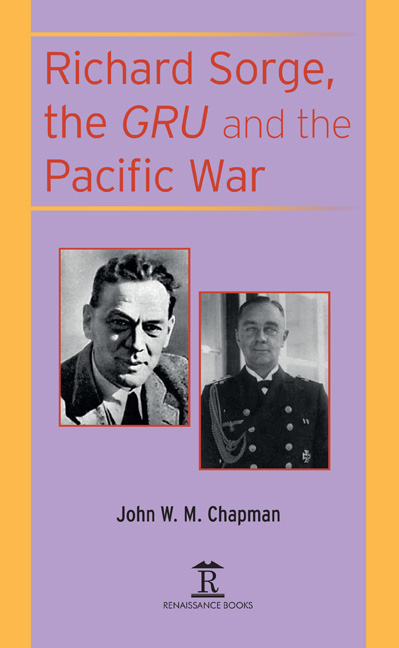Book contents
- Frontmatter
- Contents
- Chart: Organization of the People’s Commisariat for the Defence of the USSR,1941
- Preface
- Introduction
- Abbreviations
- List of Illustrations
- 1 ‘All is Not Well in the Camp of the Axis Powers’: Karl von Wiegand to Hearst Press, 20 November 1941
- 2 ‘In the Matter Affecting Ambassador Ott’
- 3 The Purge of German Journalists
- 4 ‘Expressions which are Psychologically Dangerous’: General Jodl to Admiral Wenneker 24.12.1942
- 5 The Bifurcation of Intelligence in Retrospect, 1929–1937
- 6 The Bifurcation of Intelligence in Retrospect, 1937–1941
- 7 Conclusions
- Select Bibliography
- Source Materials
- Index of Persons
- Index
- List of Contributors
- Frontmatter
- Contents
- Chart: Organization of the People’s Commisariat for the Defence of the USSR,1941
- Preface
- Introduction
- Abbreviations
- List of Illustrations
- 1 ‘All is Not Well in the Camp of the Axis Powers’: Karl von Wiegand to Hearst Press, 20 November 1941
- 2 ‘In the Matter Affecting Ambassador Ott’
- 3 The Purge of German Journalists
- 4 ‘Expressions which are Psychologically Dangerous’: General Jodl to Admiral Wenneker 24.12.1942
- 5 The Bifurcation of Intelligence in Retrospect, 1929–1937
- 6 The Bifurcation of Intelligence in Retrospect, 1937–1941
- 7 Conclusions
- Select Bibliography
- Source Materials
- Index of Persons
- Index
- List of Contributors
Summary
ONE OF THE principal features of the various historical accounts of the Sorge Affair that needs to be more accurately characterised is that of Sorge's relationship with Meisinger. It is clear that Meisinger was located in Tokyo for only a small part of his service as Police Liaison Officer prior to his recall by Ott from Shanghai following Sorge's arrest, as Meisinger and his new wife found Shanghai a much more attractive location within East Asia than Tokyo. Meisinger clearly was encouraged by Sorge to indulge in whatever fleshpots were available in Tokyo when he first arrived there in April 1941. Meisinger was clearly despatched to Tokyo before the outbreak of war with the Soviet Union and soon after the despatch of Wohlthat from the Four- Year Plan Ministry to negotiate a trade agreement with Japan at a time when it was recognised that steps would have to be taken to replace the land route through Russia for vital supplies of rubber for the German war economy. At first, it was hoped that the Japanese could be persuaded to despatch rubber on board Japanese vessels to Europe after the Japanese Naval Mission was delivered by the auxiliary cruiser, Asama Maru, and hopes were entertained of a Japanese assault on Singapore and the Dutch East Indies without the United States being drawn into the conflict.
If one examines Schellenberg's activities at this time, he was busily worming his way into the confidence of Counsellor Kramarz of the Military-Political Department of the German Foreign Ministry and subsequently suggesting that the liaison officer of the Abwehr, von Bülow, be replaced by someone with closer Party and Gestapo connections. The replacement was a close friend of Ribbentrop, Under-Secretary (Inland) Luther, who broached the suggestion put forward by Schellenberg that Abwehr officers in diplomatic missions abroad responsible for counter-espionage be replaced by police liaison officers. At the end of 1940, Meisinger was transferred from Warsaw for training within Schellenberg's department, but when he reached East Asia his telegrams and telephone contacts were always with Heinrich Müller, never Schellenberg.
- Type
- Chapter
- Information
- Richard Sorge, the GRU and the Pacific War , pp. 103 - 112Publisher: Amsterdam University PressPrint publication year: 2020

